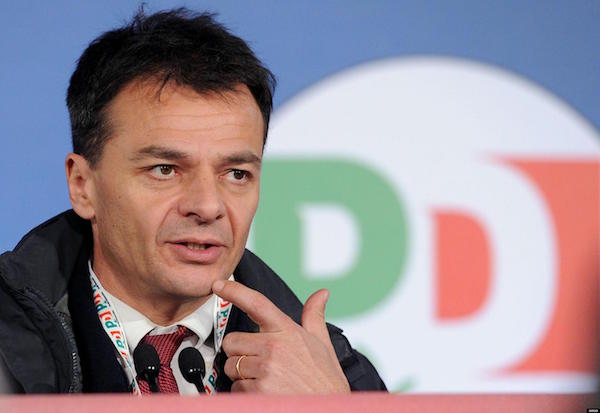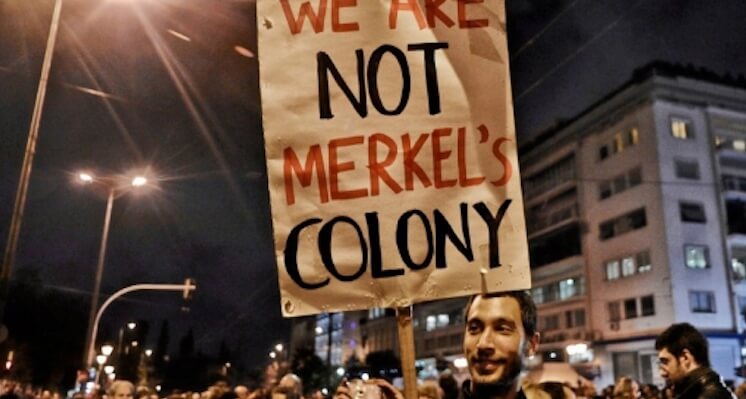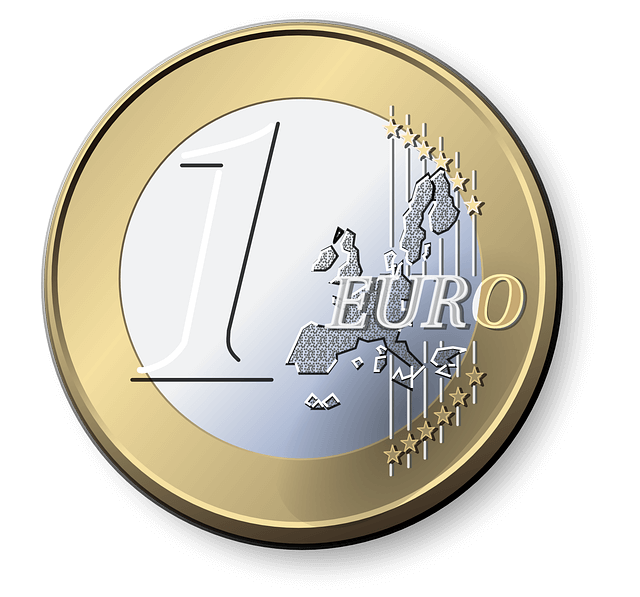Stefano Fassina was Vice Minister of Economy and Finance of Italy, but he left the government after a disagreement with policies of PM Mateo Renzi. He is now in the center of an effort to reunite and put some new life into the forces of the Italian Left, once the strongest in all Western Europe. Proponent of an “orderly” dissolution of the Eurozone, he believes that the proposal for a Greek “assisted” exit from Eurozone, put on the table last summer by the German Minister of Finance presented some interest, as a basis of discussion. But of course he admits that this proposal was not providing for serious alleviation of the Greek debt or its denomination into its new national currency.
Speaking about Greece, even more important than the problems Euro is creating to Greek economy are the problems the service of its unsustainable debt creates. The debt mechanism is the main “weapon”, used to destroy Greek economy, society, political system and sovereignty, submitting the country to the collective power of the “Creditors” (International Finance, Germany, EU bureaucracy and ECB). The full service of all the debt, public and private, till the last euro, by anybody having contracted it, that is the full satisfaction of all claims of Finance over states, nations, persons or legal entities, seems now to be the fundamental “principle” of the new “financial totalitarianism”, adopted by German government and imposed on all European governments and, also, the main tool to achieve “regime change” in Europe.
After the Greek debacle, last July, Srefano Fassina advocated a kind of Alliance of “national liberation Fronts”, to counter the “Euro dictatorship”, which should include both leftist and “sovereignist” forces. This is a debate which is just now beginning seriously in Europe. Every new month adds new “explosive materials” under the fabric of the Union. As the crisis of Europe will become more and more serious, political forces in the continent will be under more and more pressure to produce new ideas and define new and clear strategies, leaving behind any certainties of the past decades. In this new crisis situation, only political forces and leaders able to define in time a strategic “line” on the complex challenges Europe is facing and be able to stick to them, will have a future.
We publish an excerpt of a very interesting interview, Stefano Fassina has given us for the Athens-Macedonian News Agency some time ago, but which keeps intact its interest. Maybe it is even more interesting now, as the crisis deepens.
D.K.
D.K. What do you believe is the future of European state-nations in the light of Greek and southern Europe experience? What has to do a nation if it wants to “escape” the “euro-prison”, while other nations are not ready or willing, facing the probability of “markets” retaliation?
S.F. The events of last July in Greece made it clear to everybody that European states which joined the common currency have already lost their sovereignty, and their voters’ democratic choices are irrelevant. The euro has become a cage, a prison, as you say. It enhanced asymmetries among countries, among debtors and creditors. Unaccountable bodies, such as the European Central Bank, are able to overturn democratic choices and have the last word on national policies. This is not only incompatible with any progressive policy, it is at variance with democracy itself. A radical change, a change of the European treaties would be necessary to restore democracy, to restore a space for social policies, to stop the degradation of labour and the dismantling of what remains of our welfare states. Unfortunately, I have become very pessimistic about the possibility to achieve such a change cooperatively within the euro.
D.K. You seem to exclude any possibility of deep, radical reform of euro before going for the “dissolution of euro” scenario? But nobody has ever seriously tried to push for such a reform.
S.F. I try to be realistic. Against the possibility of a change are the national interests of creditor countries, first of all Germany, supported by part of the élites in peripheral countries, who think this is an opportunity for a neoliberal restructuring of our societies. The German government has made it clear in many occasions that they will never accept anything like a transfer union, which means that they will never accept any mutualization of debt or any move to make the European Central Bank a real central bank, i.e. a lender of last resort. The current recipes on the table involve more structural reforms, i.e. neoliberal reforms of the labour market, and deeper financial integration, but do not contemplate anything close to the radical reform we have in mind. Should we move to some kind of political union, such union would reflect the current balance of power, it would institutionalize the current policy orientation. It would be institutionalized austerity.
I’m not saying a leftist government should unilaterally leave the euro. But I think that such a government should seriously consider this possibility for two reasons: first, nothing meaningful has been done to prevent a new crisis from hitting the eurozone again, and in that case a breakup of the euro is a likely outcome, no matter we want it or not; second, having a “plan B” at hand means that our bargaining position is much stronger if we want to defy the European austerity policies and in case we find ourself in a position similar to Greece in July.
D.K. Inside or outside Euro, any leftist government would face formidable obstacles to apply even a slight “deviation” from neoliberal orthodoxy. What is the answer to this challenge?
S.F. This is true only in part. It is true that an exit from euro is not in itself the solution to our problems and that there is no way to get back to any “golden age” of national sovereignty. But, on the other hand, we should not underrate the role played by the common currency, and how the euro has become a formidable instrument that serves the neoliberal project. Through the common currency, the project of European integration has been hijacked. Either we find a way to change the balance of power and reform it, or there is no future for the Europe we have long dreamed of.
D.K. What position should European left adopt on the questions of Syria, refugee crisis, terrorism and new “cold war” with Russia. How these crises will influence the “internal” situation in Europe? (The interview was given before the recent escalation of the refugee crisis and the terror attacks in Brussels, Note)
S.F. This is a very complex question and I am not able to answer it in a few words. One thing I want to say about Syria is that we should not repeat the same errors of the last decades, when Western countries responded to the terrorist attacks starting a war that made things even worse than they were before. There are too many contradictions and ambiguities in the way Europe and the US have dealt with the many conflicts in the Middle East, and it is clear that the problem is more political – how we imagine e peaceful Middle East and how the expansive ambitions of too many players can be limited – than strictly military. Sure this is not a clash of civilization, this is not a holy war, and this is not even a “war” in any conventional sense. The crisis is already influencing the situation in Europe, but I think we should not let it affect our rights and liberties, our way of life, nor our humanitarian attitude towards refugees; if we let it change us, terrorists will have already won.











